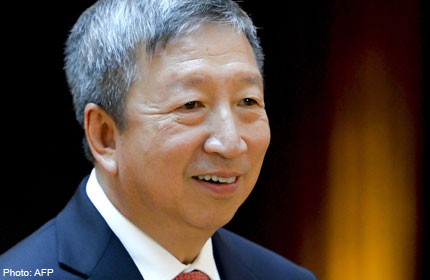Ng's legacy comes into focus


As he flitted through the corridors of power at the 125th International Olympic Committee (IOC) Session in Buenos Aires over the last week, Ng Ser Miang bumped into an Argentinian working for the South American country's National Olympic Committee.
She worked here during the inaugural Youth Olympic Games in 2010, and when I spoke to Ng on Sunday, he related how she moved him when she told him the password on her computer was "Singapore".
He was proud.
Singapore's Ng (above) is a vice-president at the IOC.
He was instrumental in giving life to the Youth Olympics, an idea of IOC president Jacques Rogge.
It is a legacy that stirs his heart.
Tonight, he will find out if 103 of his colleagues at the IOC entrust him with the most important job in sport, alongside football's Sepp Blatter.
I'm not sure how many Singaporeans will be watching TV at 11.30pm for the "live" announcement of Rogge's successor from the Argentine capital.
When the dust settles, I wonder what the legacy of Ng's candidacy will be in Singapore.
I hope his bid to be the leader of one of the two most powerful sports bodies in the world will inspire Singaporeans.
Win or lose, I hope Ng's race will send yet another signal to Singaporeans of the value and power of sport.
For years now, sport has struggled to make the kind of impact it used to in Singapore.
Where once an inter-state rugby clash in the 1970s at the Padang could attract thousands, today an international Test between the Singapore Reds and Taiwan at Yio Chu Kang Stadium struggles to make a similar impact.
The Lions often roamed at the National Stadium at Kallang with 55,000 roaring them on.
As they made their way to a stirring triumph in the Malaysian Super League this year, the LionsXII didn't fill out the 7,500-capacity Jalan Besar Stadium for their home games.
It will be momentous if Ng does pip the other five contenders and become the first Asian to be IOC president.
Even if he loses, he would have played a vital role in marking Singapore's prominent spot on sport's world map.
He played a crucial role in bringing the 117th IOC Session to Singapore.
He was instrumental in Singapore's successful bid and staging of the inaugural Youth Olympic Games in 2010.
Many of the world's best young talent descended on Singapore for the Games, but a number of events struggled to capture the imagination of many Singaporeans.
The late E.W. Barker made a call for a sports ministry as far back as the 1970s but it did not materialise.
Ho Peng Kee, former Minister of State in the Ministry of Law and the Ministry of Home Affairs, and ex-president of the Football of Association of Singapore, made a similar pitch in 2001, and nothing came of it.
Lukewarm
While the Government has poured in millions to build the Singapore Sports School and boosts the coffers of national sports associations, the Ministry of Community Development, Youth and Sports actually became the Ministry of Culture, Community and Youth (MCCY) in 2012.
While the $1.3 billion Sports Hub enters the final phase of construction before it opens next April, parents and their talented young sons wonder how they will have to work through National Service while continuing to improve in their respective sporting disciplines.
While our table tennis stars, swimmers and sailors are winning at the Olympic and Asian levels, many companies continue to balk at pumping in money into sport.
Over the last few months, ministers have had the Singapore Conversation with people from all walks of life over issues like housing, transport, foreign workers and education.
Perhaps MCCY Minister Lawrence Wong could initiate a conversation on sport.
While our athletes are winning some medals at the Asian Games and the Olympics, the goal is not to try and turn Singapore into a Olympic medal-winning machine.
Or perennial qualifiers for the World Cup Finals.
It must be to make Singapore a sporting nation once again, rugged and with a top-class sports ecosystem that gives those with talent every chance of success.
Ng is not the first Singaporean to try and lead a world-famous sports institution.
In 2010, Peter Lim made a bid to own one of the world's great sports institutions, and he came close to acquiring Liverpool Football Club.
The billionaire investor backs the Singapore Olympic Foundation and rewards worthy young talent with scholarships.
He also works to find opportunities to send youngsters to top-class football environments and help them achieve their dreams.
He knows the value and power of sport.
So does Ng.
It is time Singapore does, as well.

Get The New Paper for more stories.